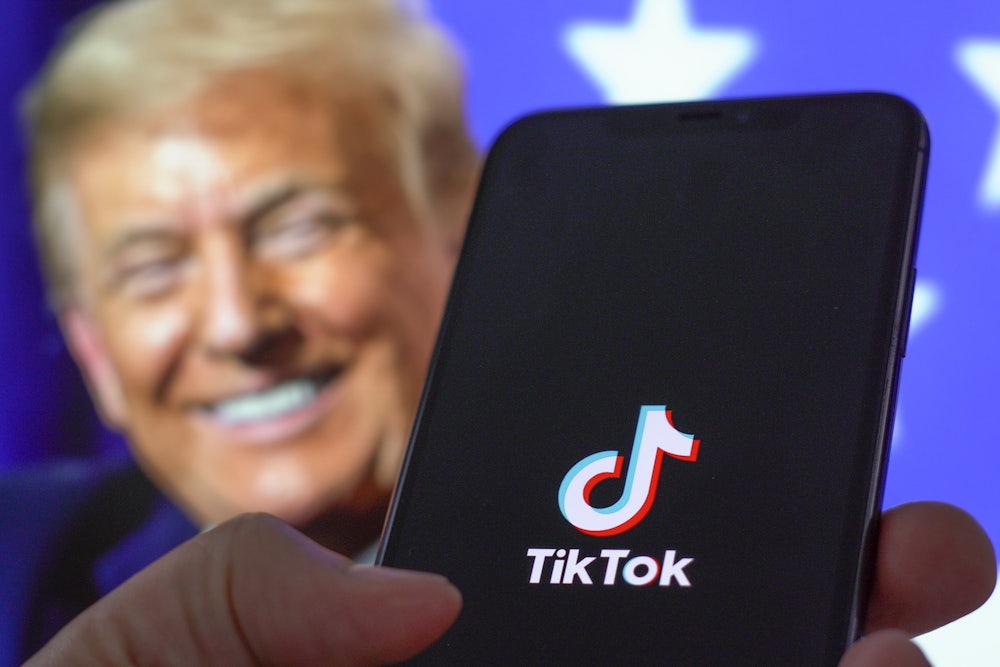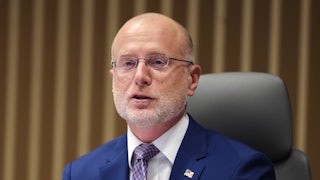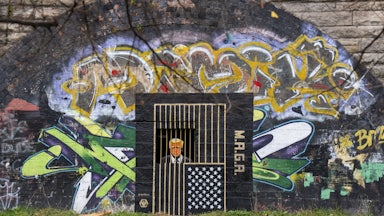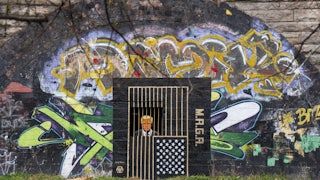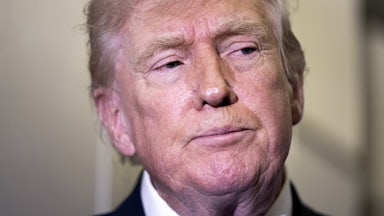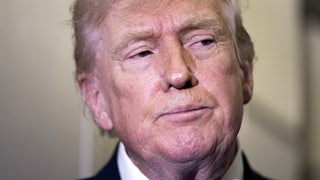Until last week, there was rare bipartisan agreement in Washington on the most pressing national security issue of our time: TikTok, the Chinese-owned video app that encourages young Americans to be woke and waste time watching sports highlights, car videos, and small business reviews. And then Donald Trump opened his mouth.
“If you get rid of TikTok, Facebook and Zuckerschmuck will double their business,” the former president posted Friday on Truth Social. “I don’t want Facebook, who cheated in the last Election, doing better.” He elaborated to CNBC’s Squawk Box on Monday that “there’s a lot of good” (“young kids … will go crazy without it,” he said) and “a lot of bad” (national security concerns) about the app, but a ban was the wrong idea for a simple reason: “Without TikTok, you can make Facebook bigger, and I consider Facebook to be an enemy of the people.”
The reversal caught many off guard, given Trump’s long commitment to banning TikTok because he reflexively opposes anything Chinese. But there’s a very obvious reason he changed his tune, and it has less to do with his hatred for Facebook than it does his unquenchable thirst for money and power—yet another reminder that Trump’s improvisational approach to governance is driven not solely by the clattering of his bird brain, but by corruption.
The push to ban TikTok began in 2020, when Trump signed an executive order that sought to remove it from app stores. After booting Trump from office, President Biden said he would sign a law doing exactly that, should it pass Congress. Last week, that looked more than plausible, as the Energy and Commerce Committee voted unanimously to advance a bill that would force TikTok’s Chinese owner, ByteDance, to divest within 165 days or face an app-store ban in the United States—thereby setting up a floor vote in the House this week.
And then Trump threw a wrench in those plans. It’s possible he’s thinking about the general election, as his standing has improved dramatically with young voters. He has also softened his stance on China, affirming its “One China” policy on Taiwan and insisting the country is only an “economic” rival of the U.S., not a military one. (He has said he would impose 60 percent tariffs on Chinese goods if reelected. And yet, Beijing seems to be rooting for him to return to the White House, if only because it believes, with good reason, a second Trump term would damage America’s global standing.)
Still, there’s little reason to believe that either politics or policy are behind Trump’s shift on TikTok. Instead, Trump was doing what he did again and again throughout his presidency: listening to a rich friend and then changing his policy advice based on their advice. In this case, the friend was Jeff Yass, a billionaire who has emerged as a powerful backer of Trump’s reelection effort. Yass, notably, also has a huge stake in TikTok—owning a reported 15 percent stake in the company, worth billions.
On March 1, Yass visited Mar-a-Lago, where Trump praised him as “brilliant” and credited him with saving the previously ruptured relationship with the Club for Growth, the powerful conservative advocacy group that had opposed many of the former president’s protectionist economic policies. Many—including former Trump chief strategist Steve Bannon—see Yass’s influence in Trump’s decision to oppose an outright ban on TikTok.
It’s unclear what Trump and Yass discussed, but as New York’s Jonathan Chait argued last week, it’s possible that the billionaire investor sold Trump on the idea that TikTok’s alleged wokeness was good for his reelection campaign. For much of the last several months, the app has come under fire for allegedly being too pro-Palestinian. This is a spurious complaint—as if the overwhelming support for a free Gaza on TikTok could only be a function of Chinese propaganda and algorithmic meddling—but it may have been useful in swaying Trump. If TikTok continues promoting this content, the theory goes, then it will damage Biden’s standing with young people.
To sway Trump, Yass may have taken advantage of the former president’s vendetta against Meta CEO Mark Zuckerberg. Trump despises Zuckerberg not for policy reasons but for demented personal ones, in this case because of his belief that the Facebook founder somehow intervened to cost him the 2020 presidential election. Trump is not interested in actual antitrust violations but sees politics and the law only as a means of punishing his foes, real and imagined. So he’s trying to block a TikTok ban because he believes, perhaps rightly, that a ban would indirectly benefit Zuckerberg.
That these arguments benefit both Trump and Yass personally is entirely the point. Yass gets to hold onto a valuable investment. Trump gets to benefit politically. Setting aside the questionable national security utility of banning TikTok, it’s a compelling portrait of how Trump actually governs. He listens to rich people and helps them get richer, as long as he gets something in return—at which point he is happy to discard whatever position he had previously held, no matter how contradictory it may seem. Trump ruled the U.S. this way for four years, and he’s reminding Americans that he’ll rule the same way for another four years.
